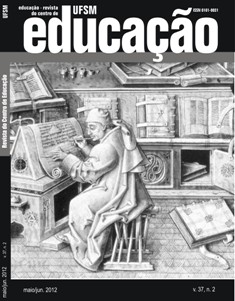Pedagical enlightenment and natural education in Jean-Jacques Rousseau
DOI:
https://doi.org/10.5902/198464444827Keywords:
Pedagogy, Natural education, Enlightenment, Dialectics of reason.Abstract
The essay discusses the importance of Jean-Jacques Rousseau for modern pedagogy, by being grounded on his philosophical-pedagogical work Émile or On Education. It seeks to present the meaning of pedagogical enlightenment as well as the concept of natural education, and the two great novelties brought by Rousseau to the educational realm, i.e., the concept of infancy and of education. In this perspective, it analyzes the three main interpretations to which Rousseau’s enlightenment was submitted along history: As an optimist of reason, primitivist and dialectician of reason. Assuming the Genevan’s thought as a defender of a dialectics of reason, the essay seeks to reflect the unfolding which every concept provokes to its project of natural education and how it reflects in the cognitive and moral development of the infants. At last it deals with the presentation of two innovations which Rousseau brings to the realm of education, the first one which deals with the concept of infancy, and the second one which deals with the pedagogical concept as a whole, by considering the phases of biological, cognitive and moral maturing, where each child is encountered.Downloads
Published
How to Cite
Issue
Section
License
Declaration of originality
We declare that all articles present in the journal Educação (UFSM) are originals and were not submitted for publishing on any other publication, as a whole or a fraction. We also declare that, after being published by Educação (UFSM), a paper will not be submitted to another journal within two years. After this time, our journal transfers the publishing rights to the authors, with a permit granted by the Editorial Council.
We also acknowledge that the originals’ submission to Educação (UFSM) implies on a transference of copyright for physical and digital publishing to the journal. In case of noncompliance, the violator will receive sanctions and penalties predicted by the Brazilian Copyright Protection Law (n. 9610, dated 19/02/98).
Attribution 4.0 International (CC BY 4.0)
This license lets others remix, transform, and build upon the material for any purpose, even commercially, and copy and redistribute the material in any medium or format.

This work is licensed under a Creative Commons Attribution 4.0 International (CC BY 4.0)






